本文主要是介绍【C++第七课-string用法】,希望对大家解决编程问题提供一定的参考价值,需要的开发者们随着小编来一起学习吧!
这里写自定义目录标题
- string的初步介绍
- sring的构造函数
- string的构造函数-重点掌握
- 无参的构造函数
- 用常量字符串来初始化
- 拷贝构造
- string的构造函数-非重点掌握
- 拷贝字符串str从pos位置开始的len个字符
- 拷贝字符串s的前n个字符
- 用n个c去初始化
- string的赋值
- string的遍历和访问
- 下标+[ ]
- 使用[ ]进行读
- 使用[ ]进行写,对s1进行逆置
- iterator迭代器
- 使用reverse算法实现逆置
- 反向迭代器
- cbegin、cend、crbegin、crend
- 范围for遍历
- at
- string的容量
- size、length -- string的有效长度
- max_size
- capacity
- 检查string扩容机制
- reserve -- 扩容
- resize
- n>capacity 扩容+尾插
- size < n < capacity 尾插
- n < size 删除数据,保留前n个
- string的增删查改
- push_back
- append
- +=
- insert / erase
- insert
- erase
- replace
- find
- rfind
- **将字符串中的空格都替换成20%**
- pop_back - 尾删
- c_str
- copy
- substr
- 取出字符串的后缀
- 强制分离
- find_first_of
- find_last_of
- +
- 习题
- 知识点补充
- 全局swap和对象里面的swap
string的初步介绍
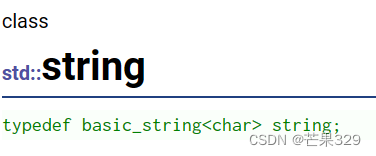
basic_string是一个类模板
string本质上是basic_string < char >,也就是管理char的,字符数组
sring的构造函数

string的构造函数-重点掌握
无参的构造函数
string();
用常量字符串来初始化
string (const char* s);
拷贝构造
string (const string& str);
int main()
{string s1;string s2("hello world");string s3 = s2;string s4(s2);return 0;
}
下面是拷贝构造,且这两行代码用法上是等价的
string s3 = s2;
string s4(s2);
打印的时候可以直接cout,因此string重载了流插入和流提取
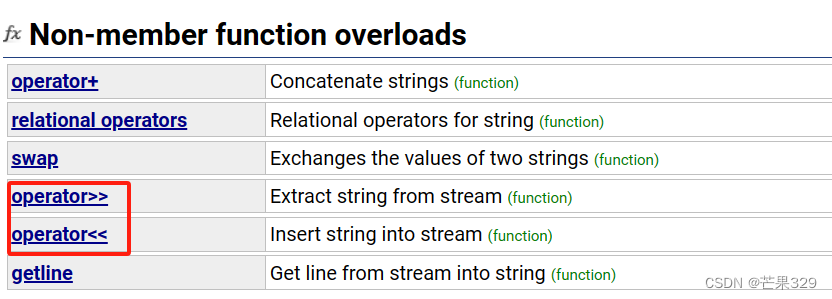
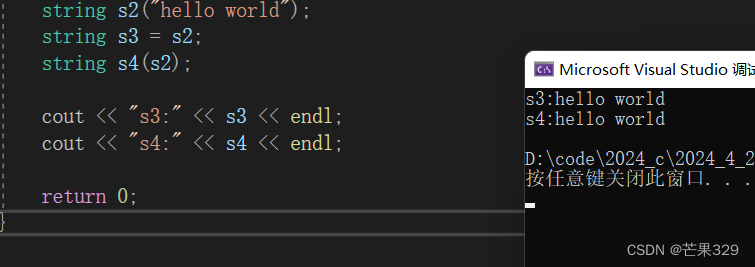
string的构造函数-非重点掌握
拷贝字符串str从pos位置开始的len个字符
Copies the portion of str that begins at the character position pos and spans len characters (or until the end of str, if either str is too short or if len is string::npos).
string (const string& str, size_t pos, size_t len = npos);
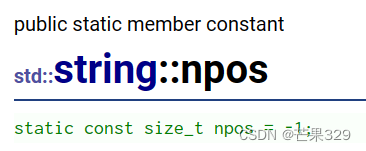
拷贝字符串s的前n个字符
Copies the first n characters from the array of characters pointed by s.
string (const char* s, size_t n);
用n个c去初始化
Fills the string with n consecutive copies of character c.
string (size_t n, char c);
string的赋值
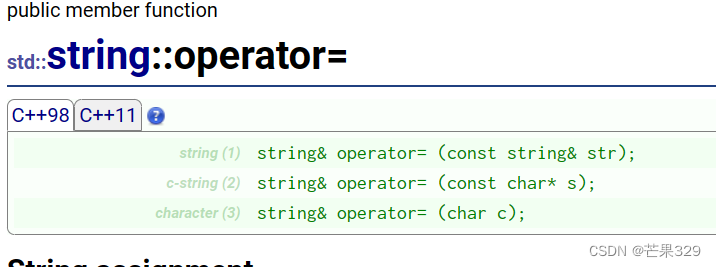
string的遍历和访问
下标+[ ]
[ ]只有在底层连续的情况下才能实现
const对象会调用const的[ ],但返回值也是const的引用,不能修改

获取数组的长度,size或length,这两作用一样
size和length都不包含\0

[ ]既可以读也可以写
使用[ ]进行读
#include<iostream>
#include<string>
using namespace std;int main()
{string s1("hello world");for (size_t i = 0; i < s1.size(); i++){cout << s1[i] << " ";}return 0;
}

使用[ ]进行写,对s1进行逆置
//逆置s1size_t begin = 0, end = s1.size() - 1;while (begin < end) //当begin==end的时候也不用交换了{char temp = s1[begin];s1[begin] = s1[end];s1[end] = temp;begin++;end--;}cout << "s1逆置:" << s1 << endl;

简化版的逆置

//逆置s1size_t begin = 0, end = s1.size() - 1;while (begin < end) //当begin==end的时候也不用交换了{/*char temp = s1[begin];s1[begin] = s1[end];s1[end] = temp;*/swap(s1[begin], s1[end]);begin++;end--;}cout << "s1逆置:" << s1 << endl;
iterator迭代器
用法像指针,但不一定是指针实现的
begin和end是左闭右开,begin指向第一个有效字符,end指向最后一个有效字符的下一个
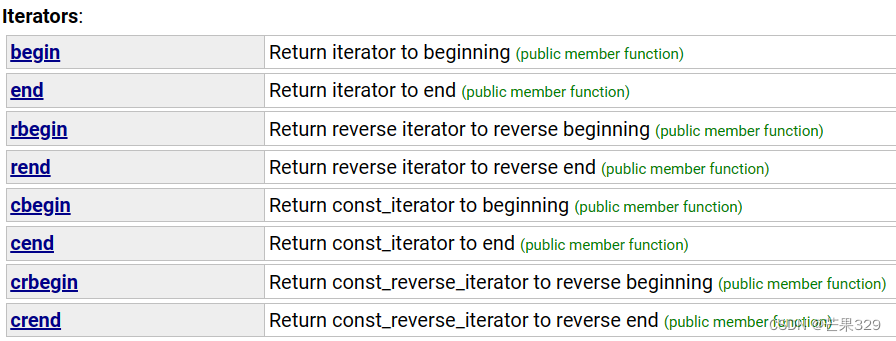
string::iterator it = s1.begin();while (it < s1.end()){cout << *it << " ";it++;}cout << endl;
使用reverse算法实现逆置

reverse(s1.begin(), s1.end());
cout << s1 << endl;

const_iterator it 本质保护的是迭代器指向的内容
*it不能被修改
const iterator it 本质保护的是迭代器it不能修改
iterator和const_iterator是两个不同的类型
反向迭代器

string s1("hello world");string::iterator it = s1.begin();while (it != s1.end()){cout << *it << " ";++it;}cout << endl;string::reverse_iterator rit = s1.rbegin();while (rit != s1.rend()){cout << *rit << " ";++rit;}cout << endl;
这里的
string::reverse_iterator很长,可以用auto代替
//string::reverse_iterator rit = s1.rbegin();
auto rit = s1.begin();

cbegin、cend、crbegin、crend
使用auto之后就不知道调的是否是const类型了
下面四个就是为了让代码更清晰一点

范围for遍历
string、list、vector都可以用,范围for底层就是iterator
for (auto e : s1){cout << e << " ";}cout << endl;
at
与[ ]区别:在越界的处理上有些区别
at:抛异常 – 警告式报错
[ ]:断言错误 – 暴力报错

`int main()
{
string s1(“hello world”);
cout << s1[20] << endl;
return 0;

int main()
{string s1("hello world");cout << s1.at(20) << endl;return 0;
}
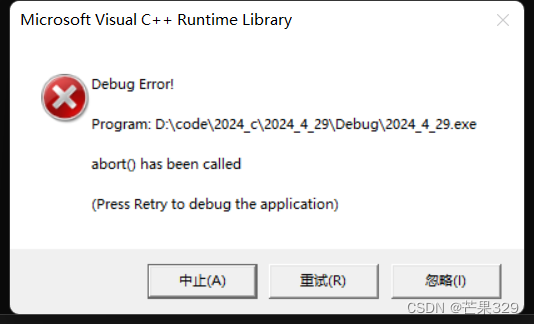
string的容量
size、length – string的有效长度

max_size
实践中没有参考和使用价值
string能开的最大个数
Returns the maximum length the string can reach.
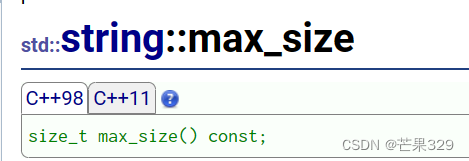
capacity
返回的是有效空间多大,不包含\0
size有效字符数量

string s1("hello world");cout << s1.capacity() << endl;cout << s1.size() << endl

检查string扩容机制
基本上是1.5倍扩容
string s2;size_t old = s2.capacity();for (int i = 0; i < 100; i++){s2.push_back('x');if (old != s2.capacity()){cout << s2.capacity() << endl;old = s2.capacity();}}
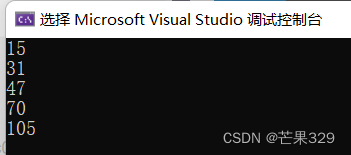
string s2;size_t old = s2.capacity();for (int i = 0; i < 500; i++){s2.push_back('x');if (old != s2.capacity()){cout << s2.capacity() << endl;old = s2.capacity();}}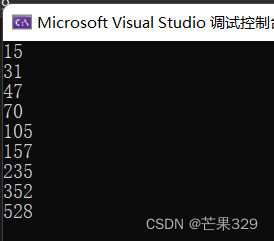
reserve – 扩容
reserve只会扩容不会缩容,只影响空间不影响数据
linux下,无数据的时候会缩,但当缩到比现有数据size还要小时,最多缩到size就不会缩了。
reserve的价值:当知道需要多少空间的时候,提前去扩
string s2;size_t old = s2.capacity();s2.reserve(500);for (int i = 0; i < 500; i++){s2.push_back('x');if (old != s2.capacity()){cout << s2.capacity() << endl;old = s2.capacity();}}
上面s2.reserve(500)中要了500,不一定给开500,这里给开了512
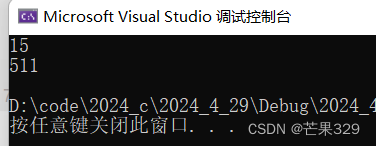
resize
既影响空间又影响数据
常见使用常见:开空间+初始化

如果没有c时,插入的是\0,如果y有c则插入c

n>capacity 扩容+尾插
int main()
{string s1("hello world");cout << "size:" << s1.size() << endl;cout << "capacity:" << s1.capacity() << endl;s1.resize(30, 'x');cout << s1 << endl;cout << "size:" << s1.size() << endl;cout << "capacity:" << s1.capacity() << endl;return 0;
}

size < n < capacity 尾插
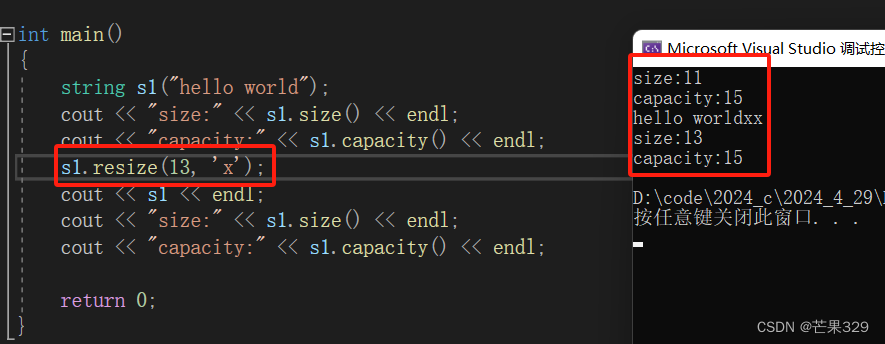
n < size 删除数据,保留前n个
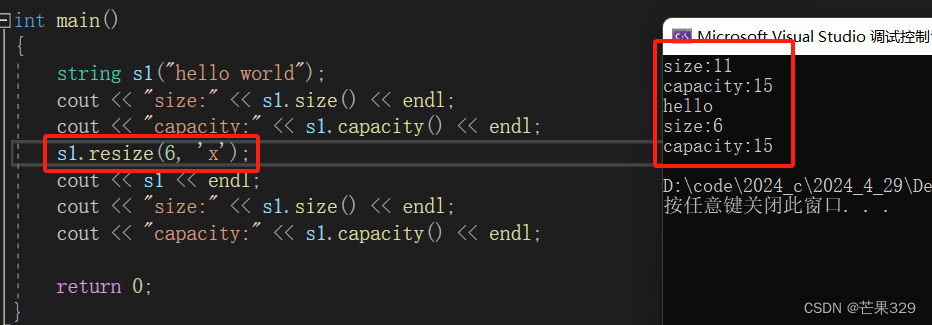
string的增删查改
改:[ ]、迭代器
差:[ ]
曾:push_back、append、+=
删:
push_back
只能一个字符一个字符的增加
append
可以增加字符串

(1)和(3)冗余了
+=

insert / erase
insert
在pos之前插入,insert是头插,需要移动数据,能少用就少用

string s1("hello world");s1.insert(5, "xxxx");cout << s1 << endl;s1.insert(5, "zyh123456", 2, 4);cout << s1 << endl;const char* c1 = "hhh";s1.insert(5, c1);cout << s1 << endl;const char* c2 = "www";s1.insert(5, c2, 2);cout << s1 << endl;s1.insert(5, 3, 'o');cout << s1 << endl;
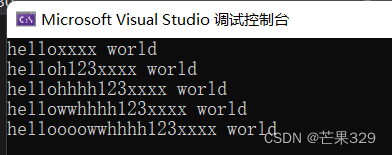
erase

如果不写4,则会默认npos(整型的最大值,size_t = -1),pos后面有多少删多少
s1.erase(5, 4);cout << s1 << endl;

replace

string s2("hello world");cout << s2 << endl;s2.replace(5, 1, "%%");cout << s2 << endl;

find
可以找一个字符/字符串/string,从pos位置开始,找不到就返回npos

rfind
与find相反,是从字符串后面找
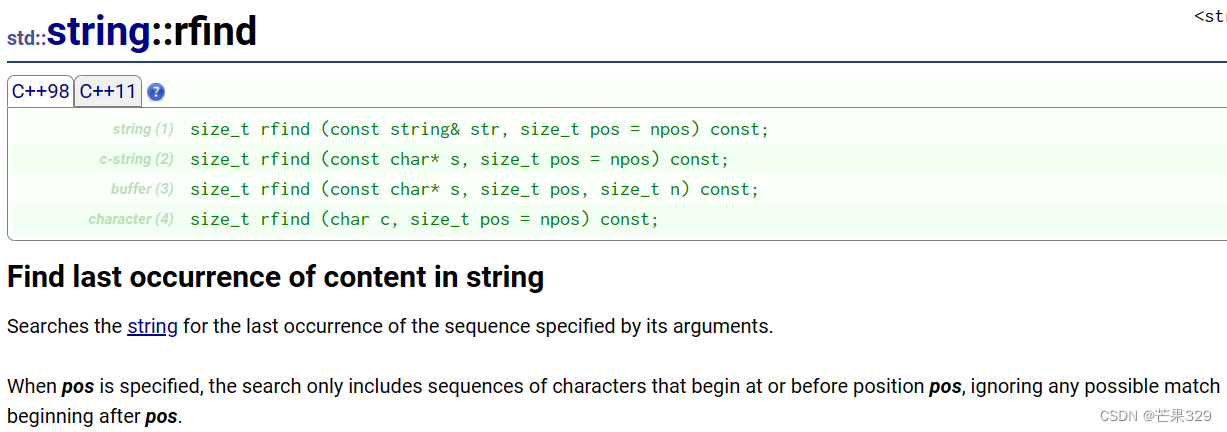

将字符串中的空格都替换成20%
方法一:使用find+replace
缺点:replace效率太低,每一次替换都要挨个挪位置
string s1("Dark light,just light each other");size_t pos = s1.find(' ');while (pos != string::npos){s1.replace(pos, 1, "20%");pos = s1.find(' ', pos + 1);}cout << s1 << endl;

方法二:创建一个新的字符串
string s1("Dark light,just light each other");string s2;for (auto e : s1){if (e != ' '){s2 += e;}elses2 += "20%";}cout << s2 << endl;

pop_back - 尾删
一次只能尾删一个

string s1("hello world");s1.pop_back();cout << s1 << endl;

c_str
把sring转换成字符串,目的是为了使用一些C语言的接口
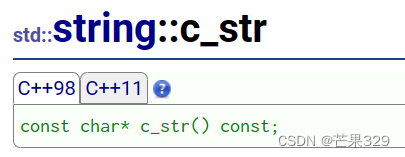
string filename("test.cpp");FILE* fout = fopen(filename.c_str(), "r");char ch = fgetc(fout);while (ch != EOF){cout << ch;ch = fgetc(fout);}
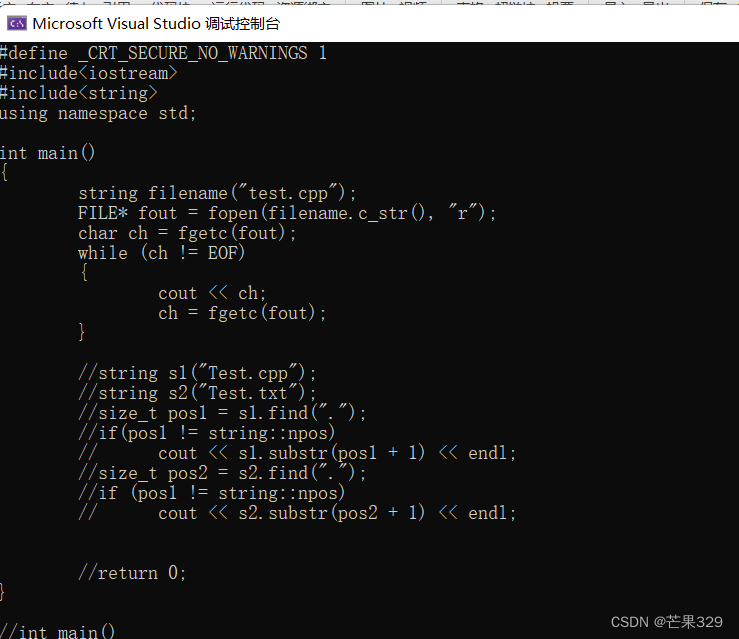
copy
从当前string字符串pos位置开始,copy下一个长度为len的字串,放到指针s所指的地方
返回值是s中的有效字符长度

char b[10];string s1("hello world");size_t length = s1.copy(b, 5, 6);b[length] = '\0';cout << b << endl;

substr
从string的pos位置开始,取长度为len的字串

取出字符串的后缀
string s1("Test.cpp");string s2("Test.txt.zip");size_t pos1 = s1.find('.');cout << "s1:" << s1.substr(pos1) << endl;size_t pos2 = s2.rfind('.');cout << "s2:" << s2.substr(pos2) << endl;

强制分离
string str("https://cplusplus.com/reference/string/string/swap/");string sub1, sub2, sub3;size_t pos1 = str.find(':');sub1 = str.substr(0, pos1);size_t pos2 = str.find('/', pos1 + 3);sub2 = str.substr(pos1 + 3, pos2 - pos1 - 3);sub3 = str.substr(pos2 + 1);cout << sub1 << endl;cout << sub2 << endl;cout << sub3 << endl;

find_first_of
查找str/s/c中任意一个字符在string中第一次出现的位置
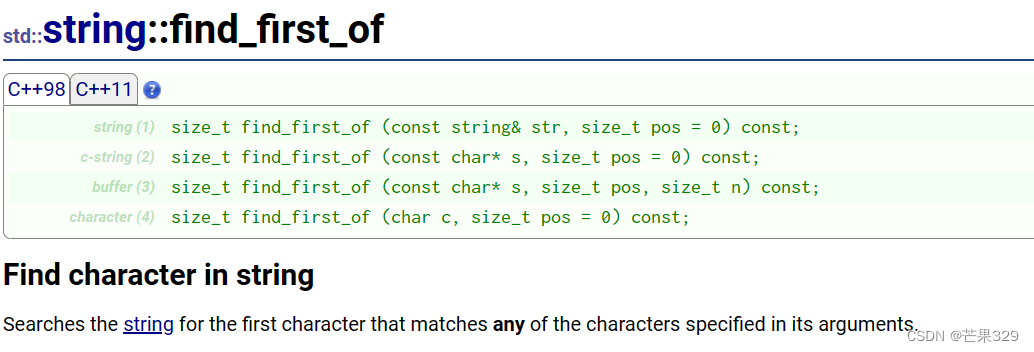
string s1("Life is like a piano. What you get out of it depends on how you play it");size_t pos = s1.find_first_of("adt");while (pos != string::npos){s1[pos] = '*';pos = s1.find_first_of("adt", pos + 1);}cout << s1 << endl;

find_last_of
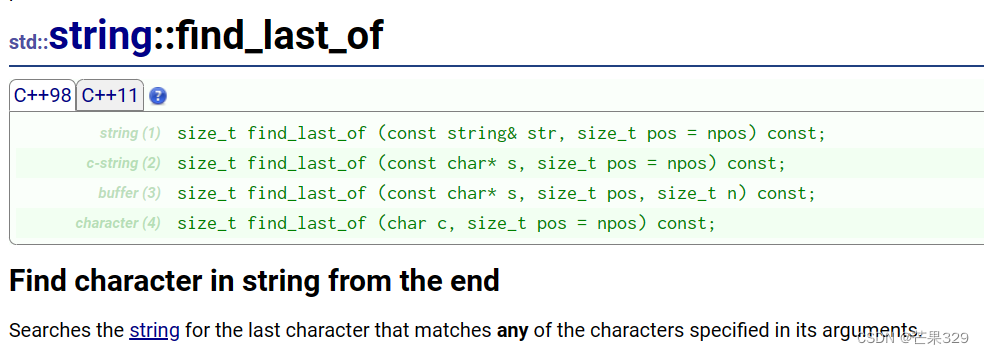
void SplitFilename(const std::string& str)
{std::cout << "Splitting: " << str << '\n';std::size_t found = str.find_last_of("/\\");std::cout << " path: " << str.substr(0, found) << '\n';std::cout << " file: " << str.substr(found + 1) << '\n';
}int main()
{std::string str1("/usr/bin/man");std::string str2("c:\\windows\\winhelp.exe");SplitFilename(str1);SplitFilename(str2);return 0;
}
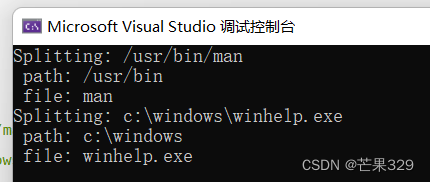
+
+是非成员函数

(2)和(3)交换了参数又写了一遍的目的:为了满足下面的两种用法
string s1("hello world");string s2 = s1 + "xx";string s3 = "xx" + s1;cout << s2 << endl << s3 << endl;
像之前写的那个日期类的+
date + 100可以这么用,但不能写成100+date
如果想用第二种形式,那就要交换参数,但想要交换参数就不能是成员函数,因为如果是成员函数,那么第一个参数就是this指针。
习题
找字符串中第一个只出现一次的字符
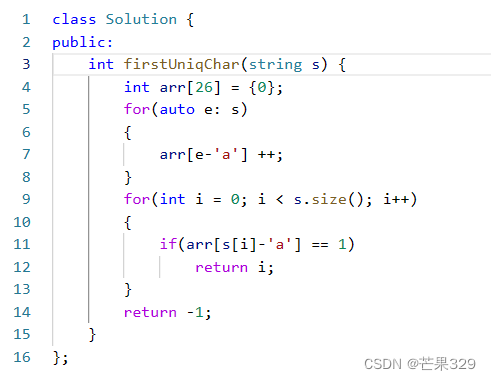
大数运算
字符串相加
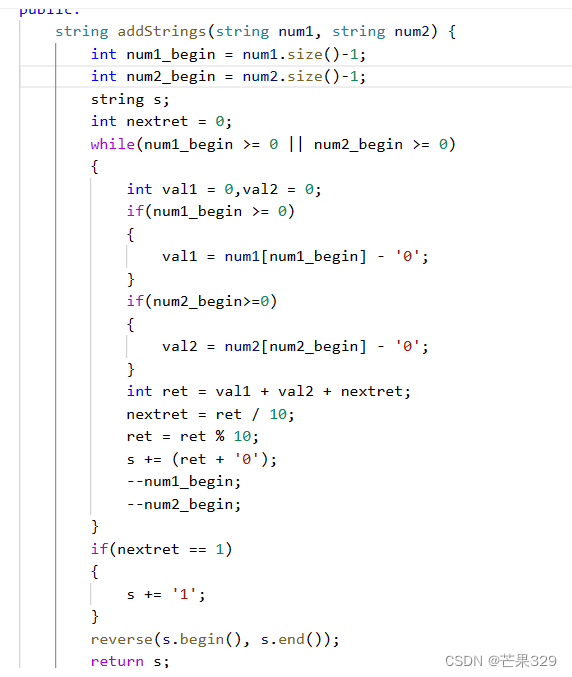
整型和字符进行运算的时候,是整型和ascii码进行加减
最后一个单词的长度
#include <iostream>
using namespace std;int main() {string a;getline(cin,a);size_t pos = a.rfind(' ');if(pos != string::npos){cout << a.size() - pos - 1 << endl;}else {cout << a.size() << endl;}
}
不能使用
cin >> a,因为这样遇到空格就会停下,scanf也是用到空格就停下
知识点补充
全局swap和对象里面的swap
对象里面的swap

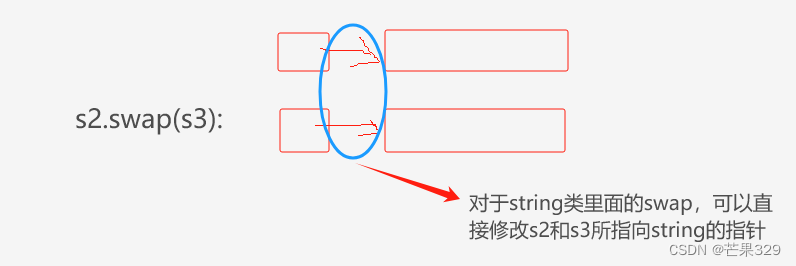
全局的swap
对于全局的swap则需要创建一个临时对象
swap(s2,s3);
综上来看,全局的swap效率更低
这篇关于【C++第七课-string用法】的文章就介绍到这儿,希望我们推荐的文章对编程师们有所帮助!



